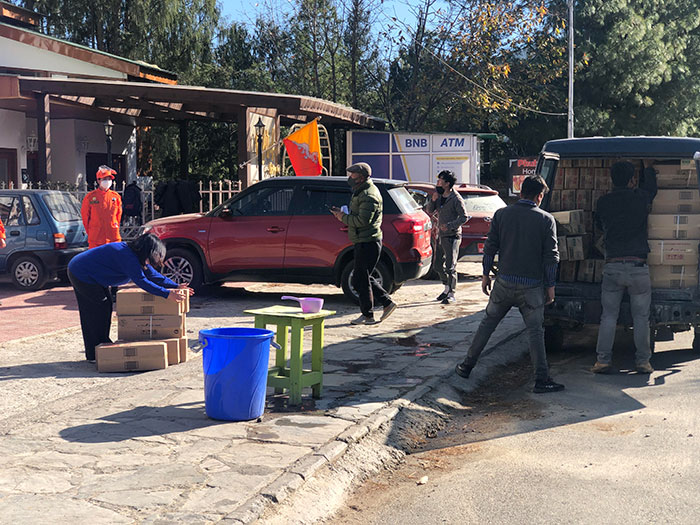Choki Wangmo
With shops in Thimphu thromde’s periphery running out of stocks, residents in the locality are facing difficulty.
A Babesa Lam Tag resident said he had been looking for dairy products for the last three days but identified shops in the zone did not have it.
Shopkeepers are waiting for the wholesalers to replenish items.
A shopkeeper at Chubogang said she sold out most of essential items, including vegetable. She is waiting for the wholesaler to deliver.
A woman residing near IT park said shops allowed to open were located towards Chubogang and she had to walk about 30 minutes. One shop was located in Serbithang. “It is difficult when we have to carry heavy items like rice.”
She said that since the shops did not have items required, she returned to the shops every day with the hope to buy new stocks. “This created more crowding although people are allocated different time zones.”
Some residents went to other zones like Babesa Lam Wog where they availed items of their choice. However, the frontline workers on duty did not allow them to get inside the shops.
Many residents living in the periphery are facing similar challenges.
A resident in Yangchenphug said that she could only buy a kilogram (kg) of potato since the shopkeeper did not sell more, stating that customers who visited in the afternoon and evening complained about the shortage.
“The shopkeeper said that he called the wholesaler thrice but did not get the items,” she said, adding that the shelves were empty.
A customer in Zilukha said shops in her zone only had snacks and she had been waiting for days for replenishment.
Those who are living further from town like Begana, Kabesa, and Changtagang are facing severe shortage of essential items.
Choney from Gaselbama said that she went looking for flour to use in a ritual but had to use soil to make effigies. “We no longer complain about shortage of vegetables,” she said.
Most of the shops did not have vegetables.
Chief Executive Officer of Food Corporation of Bhutan Limited, Naiten Wangchuk, in a virtual interview with BBS yesterday, said that the corporation had stocked items for six months but faced challenges in storing perishable goods.
He said 21 metric tonnes of rice, 500 kgs of cooking oil, and 400 kgs of dal were damaged.
Meanwhile, wholesale dealers Kuensel talked to shared that while they are trying to replenish goods in every nook and corner, it was challenging to supply with various protocols they had to follow after 72 hours of lockdown.
A wholesale dealer said that they had to first go for a test, which took more than two days to complete, as they had to wait for the Antigen test result.
“We couldn’t start the delivery right after test until we were declared negative,” he said. “By then I already had more than 50 shops placed their order with me.”
Another wholesaler, who did not want to be named, said that even after getting the result, they had to process for the movement card, which was again time consuming. “By then, three days had gone and I had more than 200 shops to deliver.”
A few shared that they are worried how would they meet the demand since the lockdown has extended, reasoning the protocol demands that the driver, who goes to Phuentsholing to fetch goods to restock, will have to be tested on RT-PCR compulsorily.
“We don’t have an issue in getting tested but it’s a long process since they will have to wait for their turn to get tested and then wait for the result,” a dealer said. “When we try to register for the test or call health officials, it takes time, as they are busy testing other areas.”


